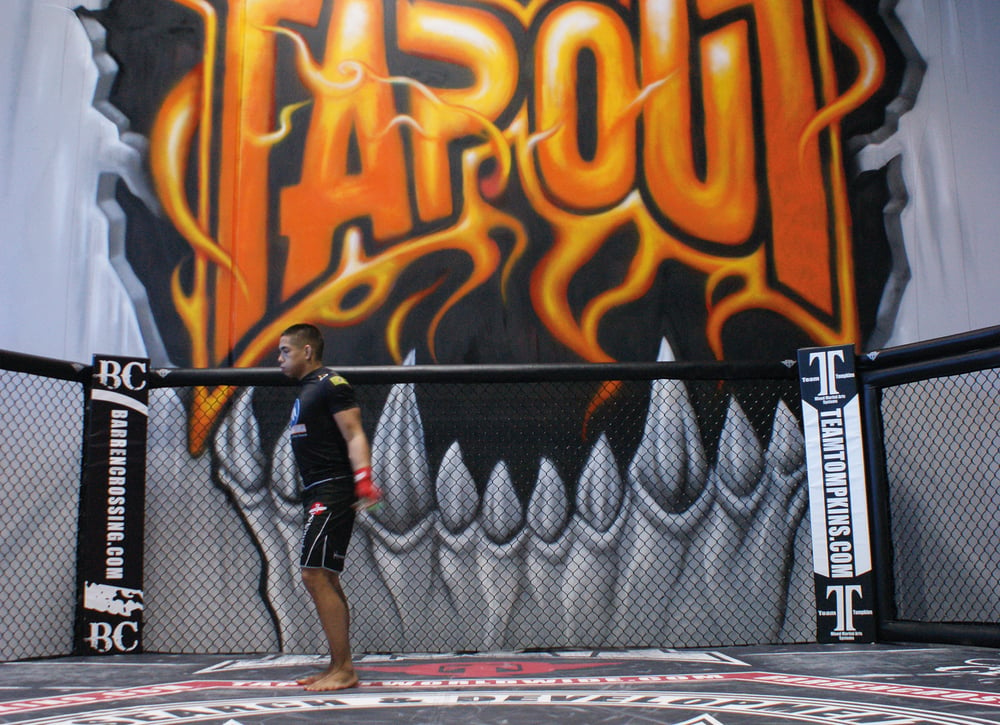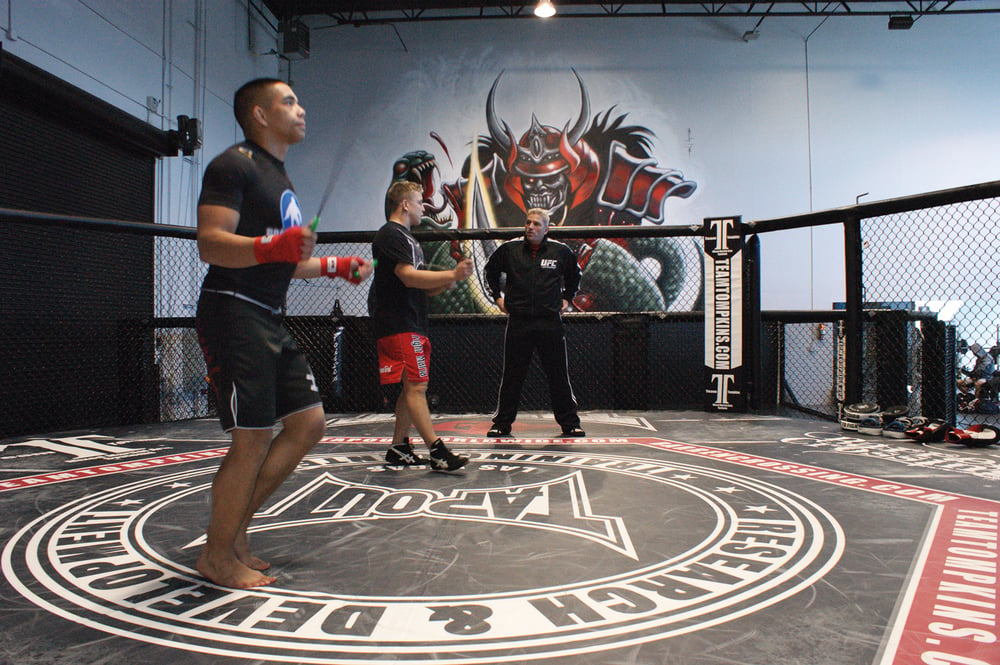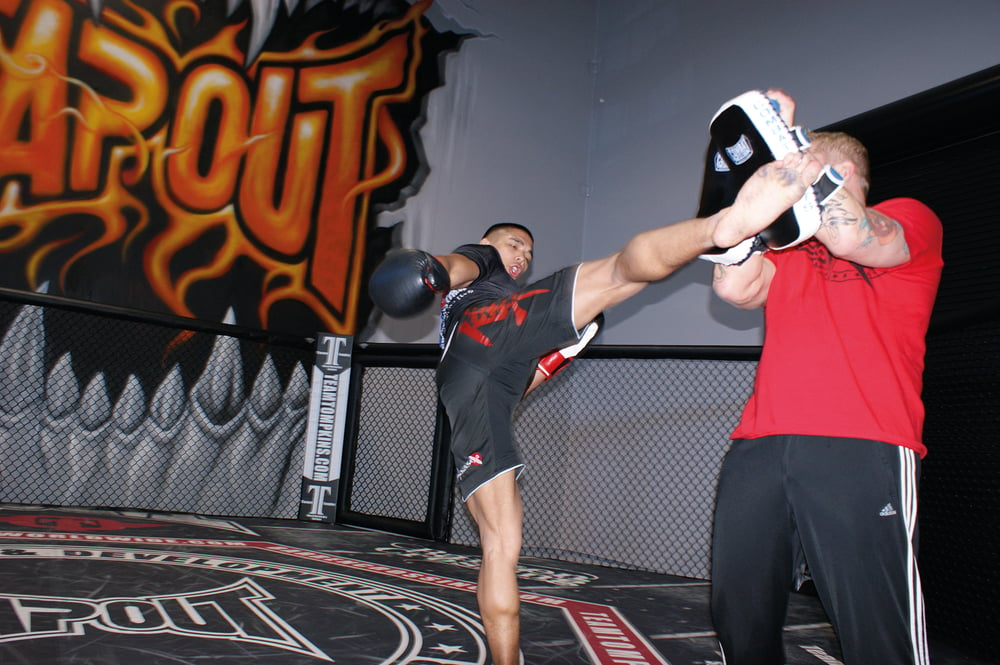
Issue 063
June 2010
Some people aspire to become a professional fighter, some find life gives them few options other than to fight for money, while some are seemingly born into it.
Ronnie Mann fits into this last category. At only 23 years of age and with 27 MMA fights to his name, he’s one of the UK’s top featherweight fighters, a brilliant technician equally happy on his feet as he is on the mat. He’s been training alongside the professionals at Trojan Freefighters since he was only 13 years old, and had his first professional MMA fight aged 17. He fought at the highest level in the UK before attracting the attention of matchmakers overseas, and has been campaigning on the other side of the world for the last two years fighting for Japanese promotion Sengoku.
Mann’s four-fight contract with Sengoku is almost at an end, but there is plenty of opportunity out there for a talented young featherweight. He began his exploration with a three-week training trip to Las Vegas where he visited the Tapout Training Center. We caught up with him upon his return to the UK to find out what’s next for this exciting young fighter.
Q: What made you choose to train at the Tapout Training Center?
A: When I was fighting in Japan I got along with Kevin Randleman, and one of his guys – one of his cornermen – invited me over. He’s one of the part-owners in the Tapout Training Center.
How long were you there for?
Just over three weeks. It was my first time training in the States.
It’s not the first time you’ve traveled abroad to train, is it?
No, I go to Holland a lot – we’ve got a good relationship with Mike’s Gym [home of Melvin Manhoef]. I’ve been going there since I was 16, that’s where I usually go when I train there. I like to go for about a month at a time.
And you’ve trained in Thailand as well?
I’ve been over to Thailand a few times as well, that’s the home of it [Muay Thai], but it’s a different style over there. Holland is good for the style I want for MMA – they’re decent boxers, they’re strong kickers as well. But in Thailand it’s more traditional – more clinch work, they’re a bit more upright. It’s not as good for MMA. The Dutch style is more on the toes, in-and-out, combinations – it’s more suited to MMA in my opinion. I do like to go to Thailand to train, work on my kicks and elbows – you can’t knock them for that, but for more specific MMA striking I prefer the Dutch style.

You were training with Shawn Tompkins while you were in Las Vegas. Tell me about that.
Tompkins is one of the best coaches I’ve been around for a while. He’s really open-minded, he adapts to your style – he’ll make you a better fighter than you already are. He’ll add to what you’ve already got rather than try and change you, like a lot of coaches, and on top of that he’s a super nice guy. Shawn is influenced by Bas Rutten, who is Dutch, and his style is very similar to the style I do in Holland anyway. If I ever did fight in the US, that’s where I’d do my camps [Tapout].
How old were you when you started fighting?
I had my first Thai fight at 13. When I was 16 I started amateur MMA fights, and I had my first pro fight in Holland when I was 17.
That’s pretty young to start fighting.
I just wanted to experience a bit of everything. I’m in no rush; I’m still young now. I’ve got a lot to do. Each show I fought on gradually got bigger. If I was to have made a big jump [from small shows to large] I probably wouldn’t be as comfortable as I am now.
You must be used to fighting in front of people. Do you still get nervous?
Yeah, but it’s not because of people watching. The nerves are because of the pressure I put on myself to perform. I don’t want to let my trainers down. I’ve got to win the fight in my head; that’s what makes me nervous, not the crowd. I know I’ve done a lot of training for it, it helps to motivate me. I think ‘Well I haven’t done all this for nothing’ – I think ‘Fuck it, I’ll just fight!’
Team Trojan has been turning out professional kickboxers for 20-odd years. What’s it like to have the support of a team like that?
We’ve got good management; we know what routes to go. We’ve got good connections because of the length of time we’ve been in the sport – we’ve always had great sparring partners, and the coaches have got a lot of experience. We like to give each other a lot of support.

I hear you’ve got a big wave of new fighters coming through pretty soon.
That’s our main goal at the moment: bring on our own guys, rather than have a lot of people come into our own team like we have in the past. We’re holding our first show where a lot of first timers will make their debut. That’s where you’ll find more loyalty, when you bring up your own people. Give it a couple of years and our name will be back on the map, you’ll see us a lot more.
You’ve fought in Japan three times now. What’s it like fighting over there?
The fans are really into it over there, you haven’t got fans like it anywhere else in the world – you get recognized in the street. The fans make it different compared to anywhere else. You can hear a pin drop because they’re so into the fights.
Japanese fighters have a very distinctive style, which is very different to American or European fighters. How do you prepare for that?
Usually I try and study them as much as I can but you have to take it as it comes. It’s hard because they’re so unorthodox, their ground game and their leg locks, but a lot of the time I try to train to simulate them.
You’ve only got one more fight on your Sengoku contract.
Yeah. The only thing with Japan is they give you fights on late notice. They only let you know a couple of weeks before a fight. The last time they only gave me three weeks’ notice. They also asked me to fight on New Year’s Eve on a week’s notice – after Christmas, after I’d put on all that weight with my Christmas dinner!
Will you stay with Sengoku or will you look to fight elsewhere?
We’re going through some stuff at the moment with a few different organizations. We’re going to see what comes up; the guys who I work with, they know which route will be the best for me to go.
I heard a rumor that the WEC are interested in you.
Err... No comment.
[Laughs] OK, let me put it this way, is the WEC a goal of yours? Would you like to be somewhere like that?
Definitely, all the best guys are there at my weight. That is the UFC of the lighter weights. That’s my goal, is to get somewhere like that. If I do manage to fight in the WEC, I could give fighters some good competition.

Fighters often have their next opponent in mind, someone they’d like to fight to advance their career to the next level. Who would you like to fight next?
I’ll fight whoever my management put me in front of. It’s a business as well as a sport. I’ll fight whoever I’m meant to fight – it doesn’t matter. When I fought [Hatsu] Hioki, he was ranked number three [in the world]. I had in my head I could beat him; I trained really hard for him.
If a fan was to see your name on a poster, what should they expect?
I give it my all. I’m more of a technical fighter, they can expect an exciting fight. Whoever I fight, I’m going to give it my all and fight to the best of my ability.
Would you ever like to go back and fight in the UK again?
I do like fighting in the UK; it’s nice to fight in your home country and the support is good. Hopefully I will again soon, but as it stands I’ll be fighting more abroad than anything; it’s where the best fights are. We’ve got some good up-and-coming fighters, I’d rather see them come through than come back and be in the mix again. There are more and more fighters coming through since the UFC came to England and there are more fighters on the international stage. The opportunities are there, but the key is you’ve got to have a good manager, you need someone behind you guiding you. It’s all about connections. Obviously you’ve got to have the skills, if you’re not a good fighter you’re not going to do it, but it’s mainly about management.
You’re 23, you‘ve had 27 MMA fights, eight Muay Thai fights and you competed in grappling competitions. Are you one of those guys who’s going to end up with over 50 fights on his record?
I like to stay as active as I can; when you get on the world stage it’s harder to do that. I used to like fighting all the time – if I could now, I still would.
Ronnie Mann spoke with Hywel Teague.










